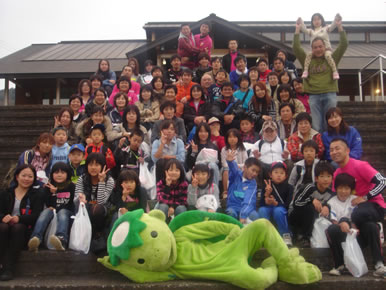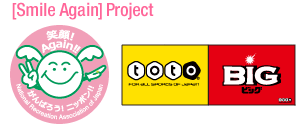Help out by donating to Recreational Volunteer Support Fund!
We are collecting donations in order to support Team Recrew's activities. The money will be used for the recreational volunteer programs.The bank transfer fee is free.
- Bank transfer details (Dedicated account for.)
Account name: National Recreation Association of JAPAN
[Mizuho bank(Code:0001), Toranomon branch(Code:046), a checking account No.2746628]
- We do not accept donations of goods.
- Contact details:
National Recreation Association of Japan, Department of General Affairs
E-mail: soumu@recreation.or.jp
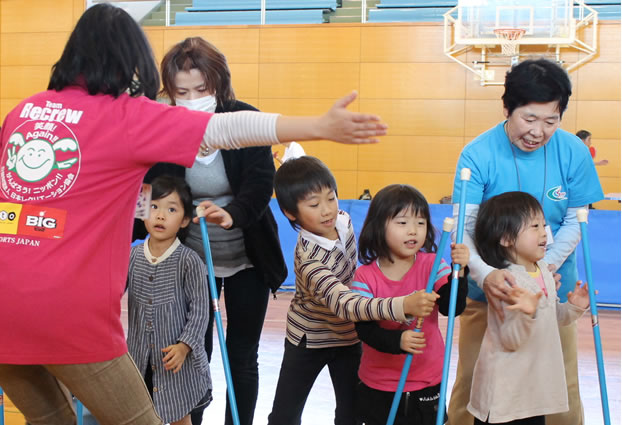
Playing unrestricted in a spacious room
“Play Castle in Soma”
Soma City Recreation Association
On November 12 (Sat.) “Play Castle in Soma” was held in the city of Soma in Fukushima Prefecture. In Soma city until recently the Soma Central Club was organizing “Play Spot Soma” as part of their effort to provide children with their own space, but that came to a halt due to the earthquake disaster. Now this work has restarted thanks to the efforts of the Soma, Fukushima and Date City recreation associations.
At 2 o’clock in the afternoon, 90 children and 30 care takers gathered together at the event venue, the Soma City Sports Arena. The “Play Castle” began with a courtesy speech by the Soma City Recreation Association president Koichi Ara, and an orientation. More than 120 participants enjoyed the program divided into three groups.
The first program consisted of games using the jumbo cards prepared by the Date City Recreation Association members. First, five groups were formed to play “getting the numbers right” (a game in which everybody needs to produce the correct number of cards in response to the number of times the leader has blown his whistle). The next game played in this group was “Old made”. All groups were given the large cards, and children could be heard saying: “Got a joker!” and “Quiet, they’ll hear you!” The game took off so well that it turned into an outright competition and every time a desired card was drawn, joyous “Yes!” resounded in the room.
The second program was “Challenge the Game”. Members of the Fukushima City Recreation Association lead the way in this program where the challenge the participants were facing was catching sticks. Very quickly, a practice in moving sticks around began. In this group there were a lot of little children, and each of them was trying to join two sticks into one. Their mothers too formed a line and enjoyed the game. In the game of ring catching, played in pairs, where two participants facing each other throw several rings at a time at each other, the players seemed to be having a hard time controlling the rings, perhaps because of the excessive energy they poured into the effort. As the children gradually increased the distance between them, they would burst in laughter every time a ring was not caught.
On this day the “Project of giving dreams to children by letting them ride ponies,” carried out by the organization “Liaison Council for Youth and Children,” was also included in the event. The third program was thus about experiencing a ride on the back of a pony horse. The children who were touching the pony in the Sport Arena’s parking lot aired their impressions: “Oh, it’s warm,” “I touched his neck!”, “It’s taller than I thought,”etc.
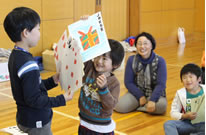
“Play Spot Soma” now has more registered participants than last year
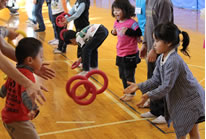
The parents say they joined in in order to let their children play unrestrictedly in a large room.
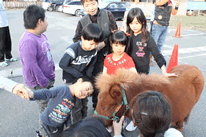
Fukushima, Date and Soma City recreation associations will jointly hold “Play Castle” in the future too.。
Children from Soma City participate in
Date City’s “Play Castle”
Date City Recreation Association
Recreation Association from Date City, Fukushima Prefecture holds “Yanagawa Play Castle- Junior Recreation Club” activities all throughout the year as part of their work on creating space for children. The event they organized on November 23 (Wed., Nat. Holiday) was joined by parents and children from Soma City, who cooked and played games with children from Date City.
A mini bus carrying parents and children from Soma arrived at 9 o’clock am at the event venue, Somekawa Center for Improvement of Village Environment. They quickly changed into aprons, put on cook’s hats, and proceeded to the kitchen. The task of the day was to make Chinese dumplings and rice balls (onigiri).
First, they turned to making a dish with Chinese dumplings, for which they cut Chinese chives and cabbage. Looking at each other’s precarious hand motions, the children starting teaching each other how to hold and press the dumplings. Rolling dumplings proved a difficult task, with some of them remaining open because they were inadvertently filled with too many ingredients, while others remained flat…The end product was - idiosyncratic dumplings.
In making onigiri, the participants were required to place rice on a wrap, roll it up and shape it with their hands. The children displayed powerful imagination here too. They made onigiri in the shape of the heart, stars and Mickey Mouse.
After the participants ate the dumplings and onigiri with gusto, they started playing games. In one of the games, they formed groups at the sound of a whistle, while in the “Weather Forecast Game” they vied for seats at signs such as “sunny weather,” “cloudy weather,” “rain,” and “typhoon.” The children moved their bodies and, fully immersed, enjoyed themselves while running a relay in which paper tissues were moved around by making wind with folding fans, and a relay in which lots of wooden chopsticks were inserted in and taken out of plastic bottles.
Some children from Soma are taking refuge in Date City, so on this day there were also instances of children from Soma reuniting after a long time.
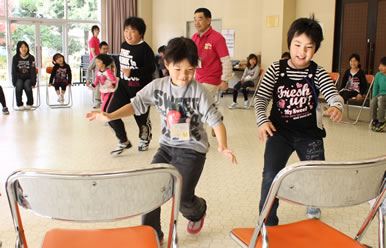
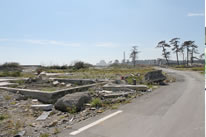
Since Soma City and the coastal part of Minami Soma City have been hit by the tsunami, the children have nowhere to play
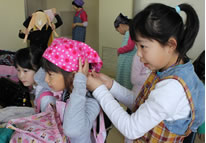
“Play Castle,” organized by the Date City Rec. Association, has been conducted since 2004 and has become an activity children look forward to every year
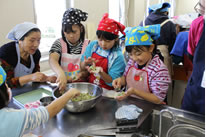
Number of registered members at Yanagawa Play Castle - Junior Recreation Club higher than in an average year
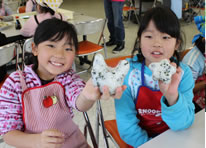
Date Recreation Association activities can be viewed in a blog: http://date-rec.jugem.jp/
Holding “Friendship and Health Class”
even in small temporary housing areas
Miyako City Recreation Association
Miyako City Recreation Association, which has been offering support in shelters and schools located in disaster-stricken areas, started their work in temporary housing areas in October.
On November 6 (Sun.), Makiko Sakamoto, Setsuko Endo, Mihoko Kumagai, Satoko Ozuchi, and Akira Sakamoto visited the common room in temporary housing area in Takahama (44 houses). We were told that, in fact, a lot of other members too wanted to participate but that the number of persons had been limited to five out of consideration for the room size.
Unfortunately, it was raining on that day. The participants did not show up at the appointed hour, 10 o’clock am. They say that, because looking at the devastation non-stop makes them feel down, the residents tend to go deeper into the land on weekends. We were a bit worried that no one might come, but as the first one or two participants arrived, they offered to invite others, so, finally, five residents took part in the event.
Mrs. Sakamoto broke the ice and had the residents start exercising by using the Miyako dialect: “First, we shall do the so called 3B exercises to warm up, though in the Miyako dialect we pronounce the world ‘cold’ the same as ‘3B’.” After several simple moves such as gripping the 3B exercise dumbbell (a cushion filled with air), pressing it with both hands in front of the chest and squeezing it with the knees were introduced, the participants started exercising to the tune of the good, old songs such as the folk song “Matsunoki” or a song by Yuzo Kayama, as well as a hit by Kiyoshi Hikawa. The Miyako Recreation Association members took turns in leading the exercises. After each song, the participating residents were taking parts of their clothes off and saying: “It’s getting hot”, “Let’s turn off the heater.”
After four or five songs, the participants went on a tea brake. One of them, while listening about the life in the temporary housing, exclaimed: “You are my daughter’s classmate, aren’t you!” She realized that she knew one of the persons who live here in the housing. The two then started talking in the local dialect, and old ties were reestablished with an even deeper intimacy. This, perhaps, is one of the good things about having a local recreation association do the support work.
In the second part of the session, the participants did exercises to the sound of songs but without using tools, and also enjoyed some games. The participating residents expressed pleasure when they were doing exercises intended for moving and bending the body: fingers, arms and torso. During “Sukiyaki rock, paper and scissors” (a game in which the goal is to complete a picture of a sukiyaki dish with painted cards), loud laughter could be heard every time a wrong or right card was drawn from a bag.
“I had a good laugh, a good laugh,” the participants were saying. Among them was a person who, talking about the life in the temporary housing, remarked that there was not much to laugh about when at home. At the end, the participants left the common room saying they would come again.
In Miyako City there are 62 sites with temporary housing, but a lot of them are small in size: 80% of them consist of less than 40 houses, while 5% consist of less than 20. The activists from the Miyako City Recreation Center told us that they wished to continue supporting the displaced as much as possible, even if the number of participants was small.
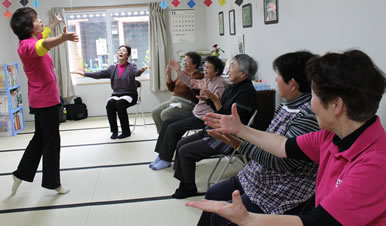 The voices saying: “Haven’t had this much laugh in quite a while!” are often heard when the exercises finish.
The voices saying: “Haven’t had this much laugh in quite a while!” are often heard when the exercises finish.
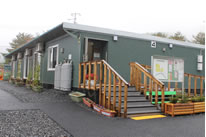
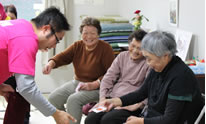
Communicating in the local dialect - one of the good things about having a local rec. association conduct support work.
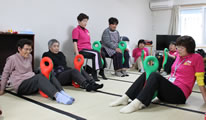
Those who cannot bend their knees may sit on a chair. Moving the body in accordance with the person’s health status.
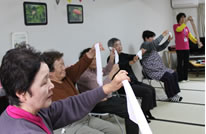
Moving the body while having fun. Four or five song-long exercise ends in no time.
Seventeen sessions with 553 participants
Tono City Recreation Association
About a month after the March 11 earthquake, on April 17, the Tono City Recreation Association invited children from the disaster-stricken areas to Tono and began their work on creating conditions for children to play freely in a lush natural environment. This activity, conducted in collaboration with the volunteer network “Tono Magokoro Net” under the title “Precious Forest Nature School”, was held 17 times in the period up to October 30 at the Kashiwagidaira Lake Resort, with the participation of 553 children and parents from the disaster-stricken areas. As many as 495 volunteers supported this activity.
On November 5, a meeting reviewing the work done and commending the effort of the volunteers was held. There, Eietsu Arakawa, vice president of the Tono Managokoro Net, reported that the success in inviting the children from the areas which suffered a devastating blow was well received in the press and that Tono City was awarded the 64th Iwate Daily Culture Award, in the Society Category, for its logistic support, which includes the project for children.
Children from 14 elementary schools from Otsuchi, Kamaishi, Ofunato and Rikuzen Takada and their parents took part in this project. The Tono City Recreation Association is scheduled to visit these schools during winter and carry out its recreational support program there, and to, from April, start inviting the children to Tono and conduct the same activities again. The association has also begun support work in temporary housing areas in Kamaishi City and Sumita Town.
